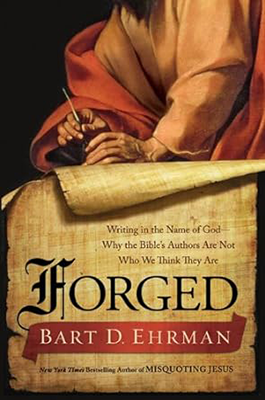Forged
“Forged: Writing in the Name of God—Why the Bible’s Authors Are Not Who We Think They Are” is a book by Bart D. Ehrman, published in 2011. In “Forged,” Ehrman examines the issue of authorship in the New Testament, arguing that many of the books traditionally attributed to certain biblical figures were likely written by anonymous authors. Here’s a summary:
Ehrman begins by discussing the concept of forgery in ancient literature and the ways in which authors in the Greco-Roman world often wrote under pseudonyms or falsely claimed to be someone else in order to lend authority to their writings. He argues that this practice was not considered deceitful in the ancient world as it is today.
Ehrman then turns his attention to the New Testament, examining specific books that scholars believe were likely written by authors other than those traditionally attributed to them. He discusses the historical and literary evidence that supports these conclusions, including inconsistencies in writing style, theological differences, and anachronisms within the texts.
One of the key themes of “Forged” is the issue of authenticity and authorship in the New Testament. Ehrman argues that many of the books in the New Testament were written by anonymous authors who falsely claimed to be apostles or disciples of Jesus in order to lend credibility to their writings. He suggests that these forgeries were likely motivated by a desire to promote certain theological beliefs or agendas.
Ehrman also examines the broader implications of forgery in the New Testament for our understanding of early Christianity and the formation of the biblical canon. He discusses how the process of canonization was influenced by factors such as politics, theology, and the perceived authority of certain texts.
Throughout the book, Ehrman emphasizes the importance of critical scholarship and historical inquiry in understanding the origins of the Bible. He encourages readers to question traditional assumptions about authorship and to approach the New Testament with a skeptical but open-minded attitude.
Overall, “Forged” offers a thought-provoking exploration of the issue of authorship in the New Testament, challenging readers to reconsider their assumptions about the origins and authority of biblical texts. Ehrman’s accessible writing style and scholarly expertise make the book an engaging and informative read for both believers and skeptics alike.

